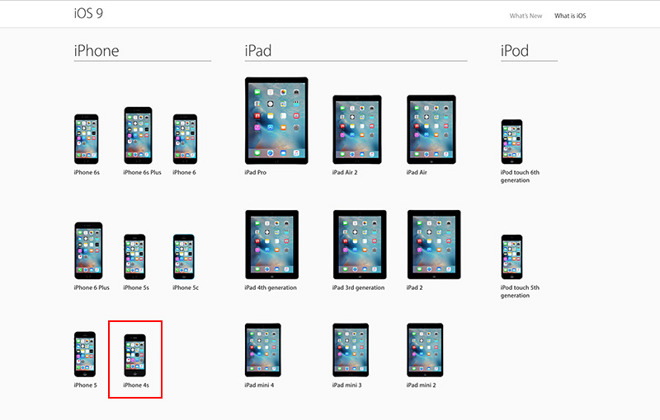A class action lawsuit lodged with a New York district court on Tuesday dredges up claims that Apple engages in planned obsolescence, saying the company knew of potential compatibility issues when it foisted its latest iOS 9 software update on iPhone 4s owners.

Plaintiff Chaim Lerman asserts Apple engaged in deceptive trade practices and false advertisement by touting iOS 9 as compatible with legacy handsets dating back to iPhone 4s models. In actuality, the complaint reads, iOS 9 significantly interferes with iPhone 4s performance, and because Apple security protocols prevent users from downgrading, owners were forced to choose between an inoperable device or spending hundreds of dollars on a new version.
The class, which includes more than 100 members, asserts iOS 9 bogged down their iPhone 4s devices to the point of being unfit for daily use. After upgrading, both first- and third-party apps exhibited delayed launch times, slow response to touchscreen input and other problems. Overall performance became sluggish, while some users, including Lerman, reported freezes and crash events.
The lawsuit goes on to claim that Apple, through "internal testing and/or through other means," was well aware of iOS 9's negative impact on iPhone 4s functionality. Despite this knowledge, the company went through with a broad marketing campaign advertising faster performance, enhanced security, longer battery life and other enticing features. Further, the company's ads, website and iOS update page fail to warn owners of older hardware, specifically iPhone 4s devices, of potential compatibility issues.
The complaint goes after Apple's iOS ecosystem itself, saying users are more likely to buy a newer device than switch away to a competing platform because of non-transferrable investments like apps. It is also argued that Apple stands to profit from new cellular carrier contract agreements, but those claims were not fully fleshed out.
Plaintiffs are seeking over $5 million in damages with an option to treble.
As with every annual iOS update, iOS 9 was designed to take full advantage of Apple's latest hardware, in this case iPhone 6s. Aside from iPhone 6s-specific features like 3D Touch, iOS 9 is built to push Apple's class-leading A9 system-on-chip, a much more capable version of its 32-bit, dual-core A5 ancestor found in iPhone 4s.
While legacy handsets are technically compatible with iOS 9, older hardware is simply incapable of performing on a par with iPhone 6s. By definition, next-generation software is limited in its support of last-generation hardware. The case, then, in part argues Apple has a responsibility to protect consumers who are unfamiliar with rapidly evolving computer technology, or by extension consumer markets.
Apple faced similar accusations in 2011 from plaintiffs in a class action complaint who claimed iOS 4 turned their iPhone 3G into "iBricks." The case was tossed a year later, though the topic of planned obsolescence continues to crop up with nearly every significant Apple release.
New York District Court Judge Sterling Johnson, Jr. is presiding over the case. No hearings have been set at this time.

